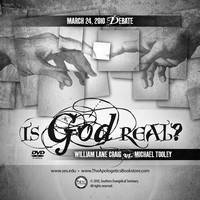Post Author: Bill Pratt
 On March 24, 2010, Christian philosopher William Lane Craig debated agnostic philosopher Michael Tooley about whether God exists. I attended the debate and thought I would share a summary with you.
On March 24, 2010, Christian philosopher William Lane Craig debated agnostic philosopher Michael Tooley about whether God exists. I attended the debate and thought I would share a summary with you.
Craig opened with 5 well-known arguments for the existence of God (some of which we’ve presented on TQA in the past – follow the hyperlinks):
- cosmological
- teleological
- moral
- resurrection of Jesus
- religious experience
Tooley opened with one argument for the improbability of God’s existence: the argument from evil.
Let’s look at this argument more closely. Tooley defined God as an all-powerful, all-knowing, and morally perfect being. What he wanted to show is that the existence of this kind of God is improbable because of the existence of evil.
He first catalogued all sorts of evils – the list was quite thorough and even poignant. Following this shop of horrors, he argued that there are certain kinds of evil where the unknown good properties of that evil (granting that God can bring good out of evil) are outweighed by the bad properties that we know come from evil. Put another way, he admitted that an all-powerful and all-knowing God could have good reasons for evil, but that we can inductively show that these good reasons cannot outweigh the “bad” from these evils.
His conclusion: since it is improbable that an all-good God could have sufficient good reasons for evil that outweigh the bad associated with evil, then it is is improbable that this all-good God exists.
How did Craig respond? Craig responded by pointing out that you cannot assign probabilities to the existence of unknown good reasons for evil. It’s like someone holding a giant bag of marbles and asking you: “What is the probability that, if you reached in, you would pull out a red marble?” You could not assign a probability because you don’t know if there are any red marbles in there at all! Tooley, likewise, is somehow claiming to assign probabilities to whether God could have unknown (his word) good reasons for evil. This is clearly impossible to do with an all-knowing and all-powerful being.
How did Tooley respond to Craig’s arguments for God’s existence? Well, he didn’t really address the cosmological and teleological arguments, content to let them stand. He did address the moral argument by claiming that you can have objective moral values without the existence of God – he pointed to several philosophers who have tried to argue this way.
He addressed the argument from the resurrection by saying that all this proves is that the God of the Old Testament exists, and that this God is demonstrably not perfectly moral – he quoted many passages from the OT that seem to indicate an immoral God.
He addressed the argument from religious experience by saying that people from all sorts of religions have religious experiences, so this cannot establish the God of Christianity.
There were, of course, rebuttals given by Craig to Tooley’s critiques, but I won’t go into all of that today. In the end, here is how they closed.
Tooley claimed that his argument from evil demonstrated that an all-good God is unlikely to exist.
Craig claimed that since Tooley had not addressed the cosmological or teleological arguments, that Tooley was, in effect, admitting that an intelligent, powerful, personal, non-spatial, timeless, creator of the universe exists; he just disputed that this creator was perfectly good. The fact that Tooley conceded so much in the debate was not lost on the audience. It was strange that he focused solely on the morality of God.
One final point to mention is the debating style of Michael Tooley. Tooley is obviously an accomplished and brilliant scholar, but his presentation was extremely difficult to follow. He presented a host of PowerPoint slides that he read from in rapid-fire fashion. Since his argument from inductive logic was quite complex (he said as much), I would wager that a very small percentage of the audience could follow it. That was unfortunate because none of us are served well by failing to understand all sides of a debate. I have studied these kinds of arguments for many years, and I was barely able to follow his argument; he was just moving way too fast.
In addition, Tooley prepared slides for his rebuttals ahead of the debate and so found himself prepared to refute Craig on points that Craig never introduced. He relied almost 100% on these prepared slides, again reading from them, line by line. It was as if he did not want to respond real-time to Craig, and this came across poorly, since Craig did respond real-time to Tooley’s arguments.
Much more could be said about the debate. If anyone else attended, tell us about what you thought. We’d love to hear from you.